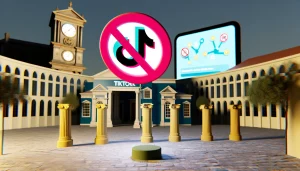
In the ever-evolving landscape of social media, TikTok has risen as a dominant force, captivating users across the globe with its engaging short-form videos, viral challenges, and eclectic content. From dance crazes to comedic skits, TikTok has become a cultural phenomenon, providing a platform for creativity, expression, and connection.
Yet, beneath its vibrant surface lies a tapestry of controversies and concerns that have prompted institutions, including universities, to take decisive action.
While TikTok boasts millions of active users and a legion of devoted fans, its ascent has been accompanied by a chorus of scrutiny and debate.
Allegations of data privacy breaches, cybersecurity vulnerabilities, and ethical lapses have cast a shadow over the platform’s meteoric rise, prompting regulatory scrutiny and public outcry. In response, universities, as bastions of knowledge and guardians of academic integrity, have grappled with the decision to ban TikTok from their campuses.
In this article, we embark on a journey to unravel the complex web of reasons behind universities’ decisions to prohibit TikTok within their academic settings.
By delving into the multifaceted dimensions of data privacy, cybersecurity, academic integrity, productivity, and regulatory compliance, we aim to shed light on the broader implications of such actions.
From safeguarding sensitive information to fostering a conducive learning environment, the motivations behind TikTok bans in universities reveal the intricate interplay between technology, society, and education.
1. Data Privacy Concerns
In an age where data is currency, universities are increasingly vigilant about protecting the privacy and security of their academic communities.
TikTok’s meteoric rise to popularity has been accompanied by a cloud of controversy, particularly concerning its data collection practices and potential ties to the Chinese government.
1.1. Allegations of Data Collection
At the heart of the debate lie allegations that TikTok surreptitiously gathers vast troves of user data, ranging from personal information to browsing habits.
Concerns have been raised about the extent to which this data is shared with third parties, raising questions about user privacy and consent.
Read Here: how to get into brown university
1.2. National Security Implications

The ownership of TikTok by ByteDance, a Chinese technology company, has further fueled suspicions about the platform’s data handling practices.
Fears that user data could be exploited for espionage or influence campaigns have led to heightened scrutiny from governments and regulatory bodies worldwide.
1.3. University Stance on Data Protection
For universities, the protection of sensitive academic and personal information is non-negotiable. With students, faculty, and staff entrusting them with a wealth of confidential data, universities must exercise due diligence in selecting platforms that prioritize data privacy and security.
1.4. Mitigating Risks
Given the potential risks associated with TikTok’s data practices, universities have opted to err on the side of caution by implementing bans on the platform.
By doing so, they aim to mitigate the likelihood of data breaches, safeguarding the privacy and security of their academic communities.
2. Cybersecurity Risks
While TikTok’s appeal lies in its entertaining content and viral trends, its widespread usage presents a double-edged sword for universities, as it brings with it a host of cybersecurity risks that cannot be ignored.
2.1. Vulnerability to Cyber Attacks
As one of the most popular social media platforms globally, TikTok has become an attractive target for cybercriminals seeking to exploit vulnerabilities for malicious purposes.
The platform’s immense user base provides ample opportunities for cyber attacks, including malware distribution, phishing scams, and other nefarious activities.
Read Here: why devry university is bad
2.2. Threats to University Networks
Universities operate complex IT infrastructures that support critical functions such as research, teaching, and administrative operations.
Any compromise to these networks could have far-reaching consequences, jeopardizing the confidentiality, integrity, and availability of sensitive data and essential services.
2.3. Protection of Sensitive Data
Given the wealth of confidential information housed within university systems, including research findings, financial records, and student data, safeguarding against cybersecurity threats is paramount.
A single breach could result in the exposure of sensitive data, leading to reputational damage and regulatory penalties.
2.4. Disruption of Services
In addition to data breaches, cyber-attacks have the potential to disrupt essential services, hindering the university’s ability to fulfill its academic and administrative functions.
The disruption caused by such incidents can have significant financial and operational implications, affecting students, faculty, and staff alike.
2.5. Proactive Risk Mitigation
Recognizing the gravity of cybersecurity risks posed by TikTok, universities have taken proactive measures to mitigate these threats.
Banning TikTok from university networks and devices serves as a preventive measure to minimize the likelihood of cyber attacks and protect digital assets from exploitation by malicious actors.
3. Academic Integrity Concerns
While TikTok offers a platform for creativity and engagement, its influence within university settings raises pertinent concerns regarding academic integrity, which universities must address decisively.
3.1. Potential for Cheating and Plagiarism
TikTok’s format facilitates the rapid dissemination of content, including educational material. While this can enhance learning experiences, it also creates opportunities for academic misconduct.
Students may exploit TikTok to share exam questions, solutions, or other unauthorized materials, compromising the integrity of assessments and undermining academic standards.
3.2. Collaboration and Dishonesty
The collaborative nature of TikTok poses challenges to maintaining academic integrity, as students may collaborate with peers or external sources to complete assignments or projects.
This collaborative environment, while fostering creativity, can blur the lines between independent work and unauthorized collaboration, leading to instances of dishonesty and academic misconduct.
Read Here: is university of phoenix a joke
3.3. Upholding Ethical Standards
Preserving the integrity of academic assessments is essential for upholding ethical standards and ensuring that students’ achievements accurately reflect their knowledge and abilities. By banning TikTok, universities signal their commitment to maintaining academic rigor and deterring behaviors that compromise the integrity of the educational process.
3.4. Safeguarding Assessment Integrity
Banning TikTok serves as a proactive measure to safeguard the integrity of assessments and prevent academic misconduct.
By restricting access to platforms that may facilitate cheating or plagiarism, universities reinforce the importance of academic honesty and underscore the consequences of violating academic integrity policies.
3.5. Promoting Responsible Learning Practices
Beyond addressing immediate concerns, universities must foster a culture of responsible learning practices that prioritize integrity and ethical behavior.
Educating students about the implications of academic misconduct and promoting alternative platforms for constructive engagement can help mitigate the risks associated with TikTok while empowering students to uphold academic standards.
4. Distraction and Productivity Loss

In an era characterized by digital connectivity and constant stimulation, universities confront the challenge of mitigating distractions and optimizing student productivity.
TikTok’s allure as a source of entertainment and diversion presents universities with compelling reasons to address its impact on academic focus and performance.
4.1. The Addictive Nature of Social Media
TikTok’s popularity stems from its captivating content and addictive interface, drawing users into endless scrolling sessions and consuming valuable time.
For students, the allure of TikTok can prove irresistible, leading to prolonged periods of distraction and detracting from academic pursuits.
4.2. Procrastination and Reduced Focus
The pervasive presence of TikTok poses a significant risk of procrastination among students, as they succumb to the temptation of engaging with entertaining videos instead of focusing on their studies.
The platform’s endless stream of content provides ample opportunities for diversion, making it challenging for students to maintain concentration and productivity.
4.3. Impact on Academic Performance
The detrimental effects of TikTok-induced distraction extend beyond momentary lapses in focus to impact academic performance adversely.
Students who succumb to the allure of TikTok may find themselves struggling to meet deadlines, comprehend course materials, or perform effectively in assessments, ultimately compromising their educational outcomes.
4.4. Fostering a Conducive Learning Environment
Universities aspire to cultivate environments that promote active engagement, critical thinking, and academic excellence.
However, the omnipresence of TikTok presents a formidable obstacle to achieving these objectives, necessitating proactive measures to minimize distractions and optimize student learning experiences.
4.5. Mitigating Distractions through Bans
By implementing TikTok bans, universities seek to mitigate distractions and create a more conducive learning environment.
Restricting access to TikTok encourages students to prioritize their academic responsibilities, allocate time effectively, and develop habits conducive to sustained focus and productivity.
4.6. Promoting Digital Wellness
In addition to addressing immediate concerns, TikTok bans offer an opportunity for universities to promote digital wellness and responsible technology use among students.
By raising awareness of the detrimental effects of excessive social media consumption and providing resources for managing digital distractions, universities empower students to strike a balance between online engagement and academic pursuits.
5. Legal and Regulatory Compliance
In an increasingly regulated digital landscape, universities navigate a complex web of legal and regulatory requirements to uphold standards of governance, privacy, and security.
The decision to ban TikTok may stem from a strategic imperative to align with prevailing laws and regulations, mitigate potential liabilities, and safeguard institutional interests.
Read Here: is hustlers university legit
5.1. National Security Considerations
TikTok’s ownership by ByteDance, a Chinese technology company, has raised concerns among policymakers and regulatory bodies regarding data privacy, national security, and foreign influence.
In response, some governments have imposed restrictions on the use of TikTok and other Chinese-owned apps, citing risks associated with data collection, surveillance, and potential ties to foreign governments.
5.2. Compliance with Data Protection Laws
Universities, as custodians of vast amounts of sensitive data, must adhere to stringent data protection laws and regulations governing the collection, storage, and processing of personal information.
By banning TikTok, universities mitigate the risk of inadvertently exposing student and faculty data to unauthorized access, data breaches, or regulatory scrutiny.
5.3. Liability and Risk Management
In an environment fraught with legal and reputational risks, universities adopt proactive measures to mitigate liabilities and safeguard institutional interests.
By preemptively banning TikTok, universities demonstrate due diligence in identifying and addressing potential risks associated with the use of third-party applications, thereby minimizing exposure to legal challenges, regulatory fines, or reputational damage.
5.4. Compliance with Institutional Policies
Universities establish internal policies and guidelines to govern the use of technology resources and digital platforms by students, faculty, and staff.
TikTok bans may align with broader institutional policies aimed at promoting responsible technology use, protecting data privacy, and maintaining cybersecurity hygiene, thereby ensuring consistency and coherence in regulatory compliance efforts.
5.5. Demonstrating Institutional Accountability
The decision to ban TikTok underscores universities’ commitment to accountability, transparency, and ethical conduct in the management of digital assets and technology infrastructure.
By proactively addressing regulatory concerns and emerging threats, universities demonstrate their proactive stance in safeguarding stakeholder interests and upholding institutional values.
5.6. Adapting to Evolving Regulatory Landscape
As regulatory landscapes evolve and new threats emerge, universities must remain vigilant and adaptable in navigating legal and compliance challenges.
TikTok bans reflect universities’ readiness to respond to dynamic regulatory environments, anticipate future regulatory developments, and adopt proactive measures to mitigate risks and ensure ongoing compliance.
Conclusion:
Universities are banning TikTok due to a combination of data privacy concerns, cybersecurity risks, academic integrity issues, distraction and productivity loss, and legal and regulatory compliance considerations.
While TikTok offers entertainment and social interaction, its use in educational settings poses significant challenges and potential threats that universities cannot afford to ignore.
By implementing TikTok bans, universities prioritize the safety, security, and academic integrity of their communities while mitigating risks associated with emerging technologies.




